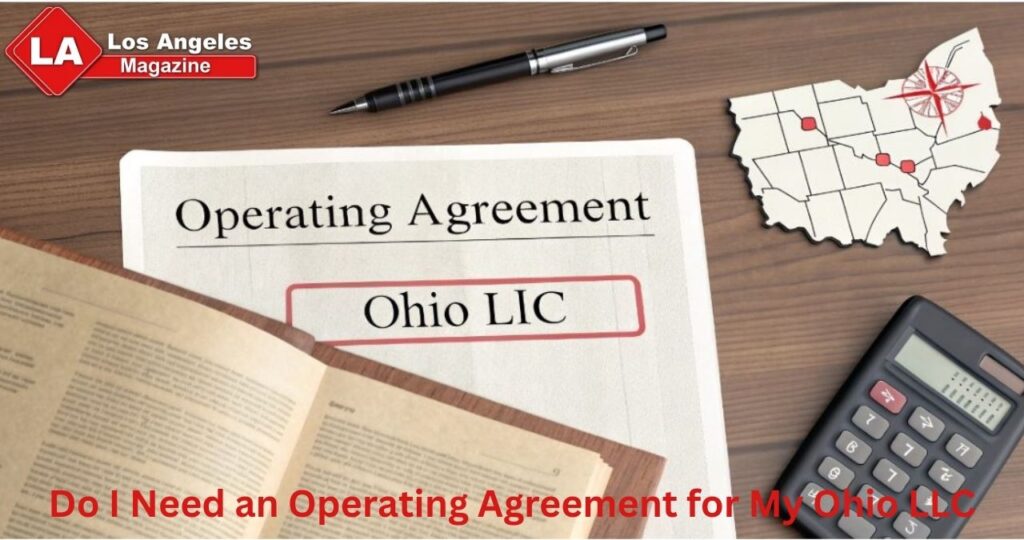When forming a limited liability company in Ohio, one of the most important yet often overlooked documents is the operating agreement. While Ohio law does not legally require LLCs to have one, having an operating agreement is strongly recommended for both single member and multi member LLCs. This document defines how your business will be run, sets rules for decision making, and outlines the rights and responsibilities of each member.
An operating agreement acts as the internal constitution of your LLC. It helps protect your limited liability status, prevent disputes among members, and provide clarity in situations where state laws might otherwise dictate the outcome. Even if you are the sole owner of your Ohio LLC, having this agreement can still be valuable for legal and operational purposes.
Understanding What an Operating Agreement Is

An operating agreement is a legally binding contract between the members of an LLC that sets out the structure and rules for operating the business. It typically covers topics like ownership percentages, profit distribution, voting rights, management responsibilities, and procedures for adding or removing members. It can also address what happens if the business dissolves or if a member wishes to exit.
Without an operating agreement, your LLC will be governed solely by the default provisions in Ohio’s LLC laws. While these default rules provide a basic framework, they may not reflect the unique needs or preferences of your business. Drafting a customized operating agreement allows you to create rules that are tailored to your specific situation.
Is an Operating Agreement Required in Ohio
Ohio does not have a state law that mandates LLCs to create an operating agreement. However, the Ohio Revised Code recognizes the validity of operating agreements and allows members to establish their own rules as long as they do not conflict with state law. This means you have the flexibility to create an agreement that works for your business.
Even though it is not legally required, having an operating agreement is considered best practice. It provides a clear plan for managing the company and serves as evidence of the LLC’s separate legal status. This can be important in legal disputes or when applying for financing, as it shows that your business is being run in a structured and organized manner.
Benefits of Having an Operating Agreement
The primary benefit of an operating agreement is that it sets clear expectations for everyone involved. It helps prevent misunderstandings and disagreements by spelling out the rules of the business in writing. This can save time, money, and stress in the long run.
Another important benefit is liability protection. Courts and lenders often look for evidence that an LLC is being operated as a separate legal entity from its owners. An operating agreement is one piece of documentation that demonstrates this separation. Without it, there is a greater risk that your personal assets could be targeted in a lawsuit.
Key Provisions to Include in an Operating Agreement
A strong operating agreement should address the ownership structure of the LLC, including how much of the company each member owns and how profits and losses are allocated. It should outline the process for making decisions, including voting rights and what constitutes a majority or unanimous vote.
The agreement should also cover how the LLC will be managed, whether by its members or by designated managers. Other important provisions include rules for admitting new members, handling member departures, resolving disputes, and dissolving the business. Clear and comprehensive provisions reduce ambiguity and potential conflicts.
Protecting Limited Liability Status
One of the main reasons to have an operating agreement is to protect the personal liability shield that comes with forming an LLC. If your company is ever sued, the plaintiff may try to argue that your LLC is not a separate entity from its owners. Having formal documents like an operating agreement strengthens the case that your LLC is legitimate and distinct.
This is especially important for single member LLCs in Ohio. Without an operating agreement, it can be easier for a court to claim that the owner and the business are essentially the same, which can put personal assets at risk. The agreement helps prove that the business operates under its own set of rules.
How an Operating Agreement Helps Avoid Disputes
Disagreements among LLC members can quickly escalate and harm the business. An operating agreement provides a clear reference point for resolving conflicts. If members disagree on a decision, the agreement outlines the process for voting or mediation.
By addressing scenarios such as profit distribution, member responsibilities, and decision making authority in advance, you reduce the likelihood of disputes. This proactive approach allows members to focus on running the business rather than arguing over operational issues.
Flexibility in Structuring Your LLC
An operating agreement gives you the freedom to design your LLC’s internal rules in a way that suits your needs. Unlike corporations, which have rigid governance structures, LLCs can be customized extensively through their agreements. You can decide how profits are split, how managers are appointed, and how voting power is determined.
This flexibility is particularly beneficial for businesses with unique arrangements or specialized industries. You are not limited to the one size fits all rules of state law. Instead, you can create a document that reflects the reality of how your business operates.
Operating Agreement for Single Member LLCs
Many single member LLC owners in Ohio assume they do not need an operating agreement because there are no other members to manage. However, even solo entrepreneurs benefit from having this document. It helps maintain the separation between personal and business affairs, which is critical for preserving limited liability.
Banks and lenders often request to see an operating agreement before approving loans or opening business accounts. Additionally, if you plan to bring on partners or investors in the future, having a pre existing agreement can make the transition smoother and more professional.
Updating Your Operating Agreement
Over time, your business may grow or change in ways that require adjustments to your operating agreement. This can include adding new members, changing the profit distribution formula, or altering management responsibilities. Regularly reviewing and updating the document ensures it remains relevant.
It is best practice to schedule periodic reviews of the agreement, such as once a year or whenever major changes occur. All members should sign any amendments to ensure they are legally binding and enforceable.
Storing and Using the Operating Agreement

Once your operating agreement is signed, keep it in a secure location along with your other key business documents. You should also provide a copy to all members so that everyone has easy access. While you do not need to file it with the Ohio Secretary of State, it should be readily available for legal or financial purposes.
Having the agreement on hand can be helpful in many situations, including resolving internal disputes, dealing with outside investors, or complying with lender requirements. Treat it as a living document that supports your business operations.
FAQS
Is an operating agreement legally required in Ohio?
No, Ohio does not require LLCs to have an operating agreement. However, it is strongly recommended to create one. It helps establish internal rules and protects limited liability status. Even single member LLCs benefit from having it. Courts and lenders often expect to see this document. Having one demonstrates professionalism and organization.
What happens if my LLC does not have an operating agreement?
Without an operating agreement, your LLC will be governed by Ohio’s default laws. These rules may not match your business needs. Disputes may be harder to resolve without written guidelines. You may also risk losing liability protection in certain situations. Operating without this document can create uncertainty. It is safer to have one in place.
Can I write my own operating agreement?
Yes, you can draft your own operating agreement. Many LLC owners use templates and customize them. However, legal advice is recommended for complex arrangements. The agreement should be tailored to your business. A well written document prevents misunderstandings. Make sure all members review and sign it.
Does a single member LLC in Ohio need an operating agreement?
While not required, single member LLCs should still have one. It shows the LLC is separate from the owner. This helps protect personal assets in legal disputes. Lenders and banks often request to see it. It also prepares you for future growth. Having one adds credibility to your business.
What should be included in an operating agreement?
Key provisions include ownership percentages, profit distribution, and voting rights. Management structure and responsibilities should be clearly defined. Rules for adding or removing members are important. Procedures for dissolving the LLC should be outlined. Dispute resolution methods can also be included. Tailor the contents to your specific business.
Can an operating agreement be changed later?
Yes, you can amend your operating agreement at any time. Changes require member approval and signatures. Updates are common when ownership or management changes. Regular reviews ensure the agreement stays relevant. Documenting changes keeps operations smooth. Always store the updated version securely.
Is an operating agreement filed with the state of Ohio?
No, you do not file your operating agreement with the state. It is an internal document kept by the LLC. However, it should be accessible for legal or financial purposes. Lenders and partners may request a copy. Keep it safe with your other business records. This protects your company in case of disputes.
How does an operating agreement protect my LLC?
It proves your LLC is a separate legal entity. This helps shield your personal assets from business debts. It also sets clear rules for members and managers. Courts view written agreements as evidence of proper operation. Without one, you rely solely on default state laws. This can weaken your liability protection.
Who should sign the operating agreement?
All members of the LLC should sign the document. This shows agreement and commitment to the terms. Signatures make the agreement legally binding. Keep signed copies in your records. If new members join, have them sign as well. This ensures everyone is on the same page.
Where can I get help creating an operating agreement?
You can hire a business attorney or use professional formation services. Many companies offer customizable templates. Legal help ensures compliance with Ohio law. Professionals can also address unique business needs. This investment can prevent costly disputes later. Assistance is especially valuable for multi member LLCs.



